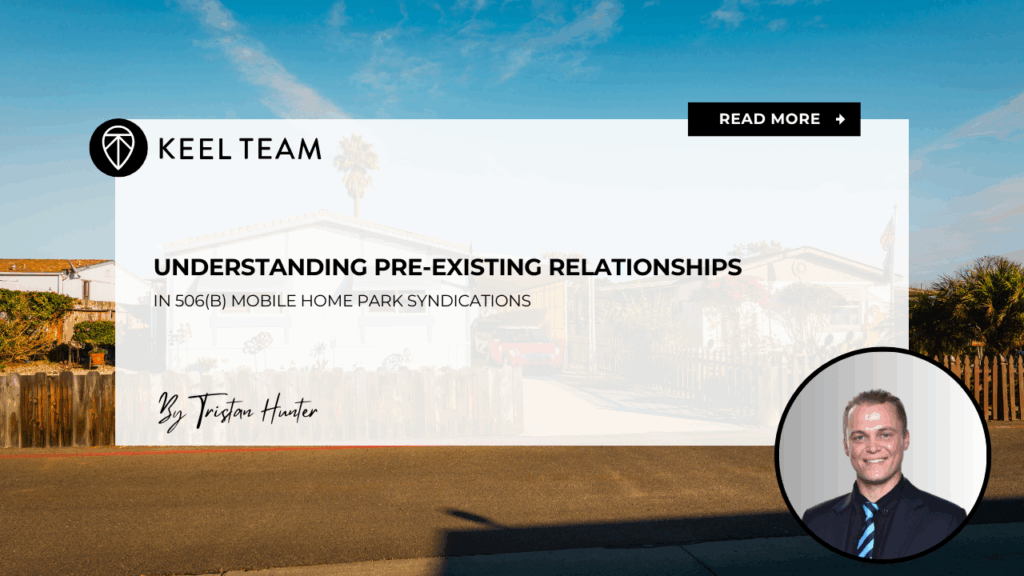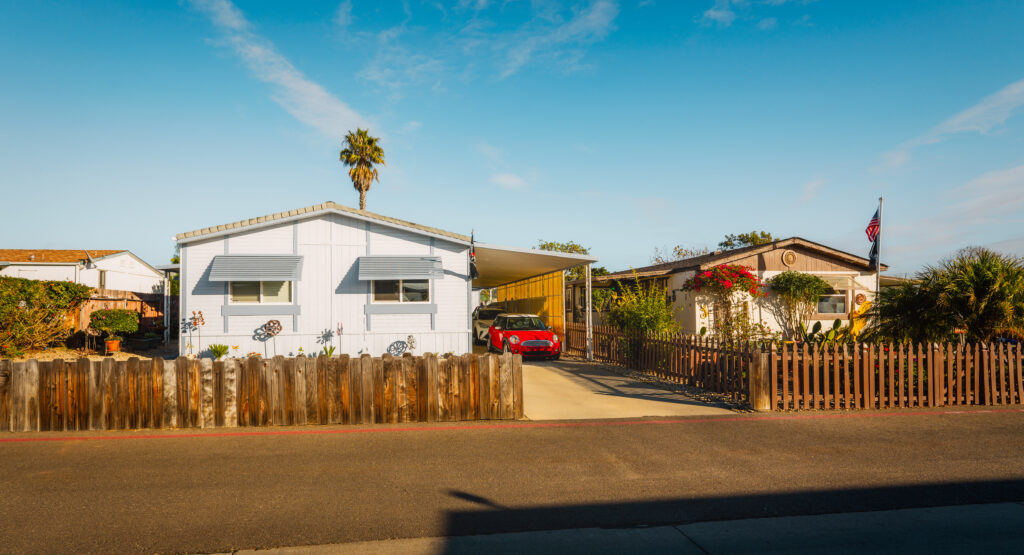Understanding Pre-Existing Relationships in 506(b) Mobile Home Park Syndications
-
 Tristan Hunter - Investor Relations
Tristan Hunter - Investor Relations

Investing in mobile home parks has become an increasingly attractive strategy for those seeking steady cash flow and long-term growth potential. Many of these opportunities are offered through Regulation D exemptions, most notably Rule 506(b) syndications. While 506(b) mobile home park syndications allow investors who are not accredited to participate under certain conditions, they also come with an important requirement: the need for a pre-existing, substantive relationship between the sponsor and the investor.
This requirement may appear simple, but it plays a critical role in how sponsors raise capital and how investors gain access to mobile home park investments. Understanding why these relationships matter can help both sponsors and investors approach 506(b) offerings with confidence.
What Are 506(b) Mobile Home Park Syndications?
A 506(b) syndication is a type of private placement under the Securities and Exchange Commission (SEC) Regulation D. In this structure, a sponsor or operator raises capital from passive investors to acquire and operate a mobile home park. Unlike public offerings, these opportunities are not open to everyone, and they cannot be advertised broadly.
Instead, the sponsor must have a pre-existing relationship with each investor before presenting an opportunity. This means that the sponsor cannot simply blast out an email to strangers or run ads online. Instead, they must know their investors personally and be able to demonstrate that a meaningful relationship exists prior to discussing a deal.
Download our FREE eBook on the Top 20 things to know BEFORE investing in mobile home parks!
Why Pre-Existing Relationships Matter
Compliance with SEC Rules
The most straightforward reason is compliance. Rule 506(b) requires sponsors to avoid general solicitation, which means they cannot market deals to the public. To stay compliant, sponsors must rely on existing relationships with investors. By doing so, they ensure that offerings remain private, controlled, and legally sound.
Building Trust Between Sponsor and Investor
From the investor’s perspective, a pre-existing relationship provides reassurance. It gives them the chance to learn about the sponsor’s track record, values, and communication style before committing their capital. For many, investing in a mobile home park syndication is a significant financial decision, so trust and familiarity play a major role.
On the sponsor’s side, building relationships ahead of a raise ensures they know who their investors are, their goals, and whether they are a good fit for the opportunity. This two-way relationship reduces the risk of misaligned expectations.
Protecting Both Parties
The pre-existing relationship rule is not just about legal compliance—it also protects investors and sponsors from rushing into commitments. Investors have time to ask questions, review past projects, and decide if mobile home park investing aligns with their objectives. Sponsors benefit because they avoid taking on investors who might later regret their decision or misunderstand the risks involved.
What Counts as a Pre-Existing Relationship?
The SEC does not provide a rigid checklist, but industry practice has shaped a common understanding.
Substantive Interaction
A relationship is considered substantive when the sponsor has enough knowledge about the investor to evaluate whether they are financially suitable for an offering. This typically involves understanding their investment experience, risk tolerance, and overall financial situation.
More Than a Single Call
A quick phone call or a single email exchange is unlikely to qualify as a substantive relationship. Sponsors often maintain a process that includes introductory meetings, follow-up conversations, and providing educational materials before any deal is presented.
Documenting the Relationship
Sponsors may also document their interactions with investors. This helps demonstrate to regulators that the relationship existed before an offering was made. Documentation might include notes from calls, email correspondence, or completed investor questionnaires.
How Sponsors Develop Pre-Existing Relationships
Educational Content
Many sponsors share general educational materials about mobile home park investing before presenting any specific deal. This might include blog posts, webinars, or guides that explain how syndications work. By doing so, they establish credibility and give investors the opportunity to learn without pressure.
Introductory Calls
Initial calls help sponsors understand who the potential investor is and what they are looking for. This is also when investors can learn about the sponsor’s background and experience managing mobile home parks.
Ongoing Communication
Sponsors often keep in touch with potential investors through newsletters, market updates, or personal check-ins. This consistent communication builds familiarity over time, ensuring that when a deal becomes available, the relationship is already established.
Investor Perspective: Why This Can Benefit You
Time to Evaluate the Sponsor
As an investor, you want to feel confident that the sponsor can deliver on their strategy. The pre-existing relationship rule gives you the time and space to evaluate whether their track record, communication style, and approach to managing mobile home parks aligns with your investment goals.
Reduced Pressure
Since sponsors cannot present deals to you until a relationship exists, you are not being rushed into a decision. Instead, you can explore the concept of mobile home park investing at your own pace.
Better Alignment
When sponsors take time to get to know their investors, they can ensure that offerings are aligned with the right audience. For example, if you are focused on long-term cash flow, the sponsor can highlight opportunities that match those objectives.

Common Misconceptions About 506(b) Syndications
“I Can Just Sign Up for a Mailing List and Invest Immediately”
In a 506(b) syndication, it is not enough to simply join a mailing list or fill out a form online. Sponsors must first develop a relationship with you before presenting an investment opportunity.
“This Rule Slows Down the Process”
While it may feel like a delay, building a relationship actually makes the investment process smoother. By the time an offering is available, both sponsor and investor are already comfortable with each other.
“Only Accredited Investors Can Participate”
This is another area where 506(b) is unique. Unlike 506(c) offerings, which require accredited investors, a 506(b) syndication allows up to 35 sophisticated (non-accredited) investors. However, this is only possible if the pre-existing relationship has been established.
The Role of Trust in Mobile Home Park Syndications
Why Trust Matters
Mobile home park investing is often a long-term commitment, sometimes lasting several years. Investors rely on sponsors to execute business plans, manage operations, and deliver updates. Without trust, this relationship can become strained.
How Trust Develops
Trust develops over time through honest communication, transparent reporting, and alignment of interests. The pre-existing relationship requirement ensures that trust has a foundation before any financial commitment takes place.
Practical Tips for Investors
Be Proactive
If you are interested in mobile home park syndications, start building relationships early. Reach out to sponsors, schedule introductory calls, and ask questions about their approach.
Look for Consistency
Pay attention to how sponsors communicate. Do they provide clear explanations? Are they responsive to questions? Consistency is often a sign of reliability.
Understand Your Role
Even though you may be a passive investor, your involvement in the early stages matters. The more open you are about your financial goals and risk tolerance, the better the sponsor can evaluate whether a specific mobile home park investment is right for you.
Final Thoughts
The importance of pre-existing relationships in 506(b) mobile home park syndications cannot be overstated. These relationships ensure compliance with SEC rules, foster trust between sponsors and investors, and provide the foundation for successful long-term investments.
For investors, this requirement offers the chance to evaluate sponsors without pressure, ask important questions, and gain confidence in their decision. For sponsors, it ensures that they work with the right investors who understand both the risks and the potential rewards of mobile home park investing.
While no investment outcome can ever be guaranteed, taking the time to establish and nurture pre-existing relationships can lay the groundwork for stronger, more informed decisions in mobile home park syndications.
Are you looking for MORE information? Book a 1-on-1 consultation with Andrew Keel to discuss:
- A mobile home park deal review
- Due diligence questions
- How to raise capital from investors
- Mistakes to avoid, and more!
Disclaimer:
The information provided is for informational purposes only and is not investment advice or a guarantee of any kind. We do not guarantee profitability. Make investment decisions based on your research and consult registered financial and legal professionals. We are not registered financial or legal professionals and do not provide personalized investment recommendations.

Tristan Hunter - Investor Relations
View The Previous or Next Post
Subscribe Below 👇




